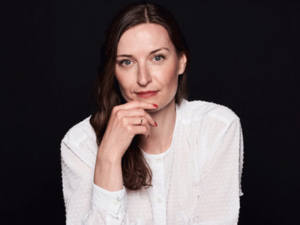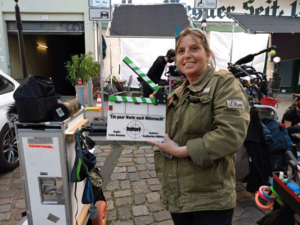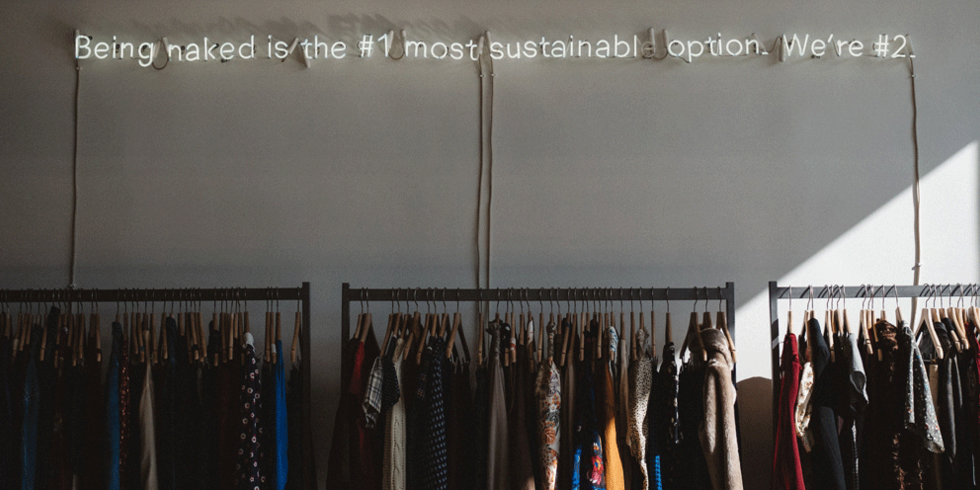Deep Dive #15: Sustainability in Berlin
Climate change, the coronavirus pandemic and economic recession: "The world is on the brink of a social and economic catastrophe," says strategist, entrepreneur and impact-led angel investor Nadine Bruder. "Only systemic change in our society can bring about solutions." We must act together as a community and prioritise people and the planet. "Today, more than ever, we need more cooperation between industries and regions, new technological innovations and a willingness to make bold decisions to overcome traditional barriers," adds Bruder, who has supported managers in international companies in successfully implementing UN sustainability goals for over 13 years.
In early 2020, the sustainability expert foundedShe For Social Impact, an international platform that promotes education and gender equality as key success factors, and also launched the She For Social Impact Awards. The aim of the awards is to recognise projects by women founders who question the status quo and whose solutions take on the ecological, social and economic challenges of our time.

Investor and Entrepreneur Nadine Bruder © Nadine Bruder
Sustainable fashion in circular design
In June, an independent jury of experts presented awards to winners in six categories. Düzen Tekkal, journalist and human rights activist at HAWAR.help, was honoured in the category culture for her work with women in war zones and with refugees, while Lisa Jaspers, co-founder and managing director of the online shop and fair fashion label FOLKDAYS, received the Public Choice Award. The presence of two Berlinese among the award winners at the inaugural ceremony was particularly pleasing for the awards founder, who also hails from the capital. “Lisa Jaspers has established a brand and fair trade business model that strikes a chord with Generation Z and millennials: high-quality products with a story, created without exploiting the workforce,” explains Bruder.
Wool cardigans from Peru, brass jewellery from Kenya and hand-woven Kilim carpets from Turkey - FOLKDAYS products are designed by artisans from over 20 countries in the Global South; the producers receive a stable income. Jaspers, a development economics graduate, "also launched the #FairByLaw petition, which calls for German companies to be fully liable for what happens along their supply chains," says the consultant. FOLKDAYS is one of many sustainable fashion businesses in Berlin: according to Greenpeace, the city has the highest number of shops offering ecologically certified fashion in Germany. According to a report by Projekt Zukunft (Project Future), more than 13 digital platforms offer sustainable fashion and accessories.
Over 30 fashion labels such as Working Titel, which designs luxury fashion without plastic, and PHILOMENA Zanetti comply with sustainability criteria in the production of their collections. Designers, consultants and PR experts from the fashion industry in Berlin have also come together to form the association Future Fashion Forward e.V. The aim of the association is to address shortcomings in the industry and campaign for transparent and fair supply chains and processes. This, in turn, will "strengthen consumer confidence, change consumer behaviour and thus lead to a more sustainable industry," according to association.
The latter is also the goal of the sustainable change agency circular.fashion, which, like other pioneers in the circular economy, is based in Berlin. The agency joined forces with the B2B fashion platform Sqetch and Embassy of the Kingdom of the Netherlands in Germany to host Circular Design Spirit in 2020. Five interdisciplinary teams from Germany and the Netherlands came together in virtual meetings to investigate how fashion designers can design for various product categories according to circular design principles. The Blazer Collective, for example, designed a jacket that is adaptable, sustainable and recyclable. An online platform connects the product with its community. Team Denim developed a sustainable premium men's denim brand that produces durable jeans made from biodegradable materials. The teams will discuss their achievements at an event in Berlin on 1 October 2020. "We are thrilled with the incredible results, and the level professionalism and creativity that the participants have shown in such a short time," said the organisers.
Spotlight on sustainability
Korina Gutsche from Bluechildfilm also has reason to be pleased. "For a long time, the media and creative industries did not see themselves as a climate-relevant sectors that needed to assume responsibility," says the environmental engineer and freelance production manager. "But that's no longer the case." Her long years of campaigning for sustainable practices in the media sector, especially in the Berlin-Brandenburg region, seem to have attracted the attention of the relevant stakeholders: the Berlin International Film Festival rolled out a “green” carpet made of 100 per cent recycled fishing nets and plastic waste. "In 2020, there were so many panels, initiatives and announcements about sustainability by all stakeholders in the media industry and the government that things can only move forward from here," enthuses the Potsdam resident.
In addition to funding for the enlistment of green filming consultants such as Gutsche for all state and federal-funded film projects, the Medienboard Berlin-Brandenburg has this year also began funding projects whose producers are committed to green filming and fair pay. Another new initiative is Keen to be Green, the first nationwide training initiative of the German Film Commissions and the various federal agencies to inform producers about alternative sustainable raw materials and the reduction of CO₂ emissions. In addition, the Green Shooting working group has also launched the 100 Green Films initiative, which lays down the sustainability criteria for film production nationwide. Similar measures have also been taken by ARD and the producers' association, which represents more than 100 independent film and television producers. "The developments in the entire film industry since the end of last year have been very positive and I am hopeful that it will address the issues seriously or, as we say today, sustainably," say Gutsche. The production manager does not want to rest on her laurels; there is still much work to do. AND ACTION! In her eyes, the film industry has to take concrete steps towards resource protection, waste avoidance and sustainable catering in order to better implement the voluntary sustainability criteria and voluntary commitments of the association. The streaming app BetterStream is also taking a further step toward sustainability. Since September 2020, the platform has been providing videos and podcasts free of charge that cover a range of topics from environmental protection to social change and personal development. The treatment of these core topics is intended to have a targeted effect on more conscious consumption of media. The resulting CO2 emissions can be offset via NABU.

Green Filming Consultant Korina Gutsche © Bluechildfilm
GMI motto: "Groove to save the world"
Jacob Bilabel for the music scene is what Korina Gutsche is for the film industry. For more than ten years, the music executive has been pursuing his vision of a festival and music industry that leads the way in implementing climate protection measures. His Green Music Initiative (GMI) started with a "getting around" concept for the Melt! music festival.
GMI also identified potential for improvement in the clubs: a nightclub with space for up to 300 guests consumes as much electricity as 33 households in a year. This is the equivalent of around 30 tonnes of CO₂ emissions per year. On top of this, there are also emissions from heating, waste and water. Bilabel and his team developed the Green Club Label and the Green Club Index using energy efficiency advice for Berlin clubs such as the legendary S036 and the techno enclave Tresor.
Under the motto "Groove to save the world", the passionate music lover from Berlin has joined forces with scientific institutes, stakeholders and artists across Germany to implement exemplary reduction strategies. Like GMI, Projekt Clubtopia also works with a network of nightlife and sustainability experts to develop solutions for sustainable club night events such as Future Party Lab. Together with BUND Berlin, clubliebe e. V., Clubcommission Berlin e. V., and with the support of LiveKomm, the Centre for Sustainable Tourism, the Eberswalde University for Sustainable Development and the Senate Department for Environment, Transport and Climate Protection, the project established a Code of Conduct for Eco-Friendly Club Operations. It also released a Green Club Guide, which gives tips on eight areas for action, including toilets, bar & counter and advice & promotion. The measures, which are easy to implement, not only protect the climate, but also save the club operator money.
Environmental protection by the book
Less is more - this is the motto for publishers who produce their products in a climate-neutral manner in order to make them as environmentally friendly as possible.
In 2018, the Berlin-based Ullstein Verlag was one of the first publishing houses to abandon the use of shrink-wrapping with the release of the crime thriller "Mother's Day" by bestselling author Nele Neuhaus, thus saving around four football pitches of plastic film. Instead, the book was given a seal. The 300,000 seals for 300,000 copies had to be produced separately: the machine for this was promptly invented using an old printing press and a roller, similar to a paint roller sold in hardware stores. The packing concept also had to be redesigned so that the books were not damaged without the protective film and the stability of the book tower for transport and stacking was preserved.
"However, experts agree that to achieve real resource savings in terms of climate protection, replacing individual components in the supply chain is not enough," say CTO Michaela Philipzen. For her, the pilot project #ohne Folie (plastic free) and the use of FSC paper from responsibly managed forests is just another step. “The processing cannot be viewed from a single sustainability standpoint either - every alternative has a different impact. We noticed that very quickly when we talked to the material suppliers and printers about individual titles. A systematic analysis of the issues with all the production managers is planned," she told Börsenblatt.
It is common knowledge that to produce and publish books, newspapers and magazines more sustainably requires the effort of more than just one publisher. In mid-2010, pioneers in the publishing industry came together under the label Green Publishing, lead by Oekom Verlag, to launch the initiative Green Publishing – New Environmental Standards for the Publishing Industry. The initiative also gave rise to the eco-label Blue Angel for Sustainable Printing Products, which has served as a certification for low-emission and resource-saving printed products since 2015.
DBM Druckhaus Berlin-Mitte was the first printing house to be certified. It is not the only seal of quality: publications are printed on FSC paper from responsibly managed forests, the products are shipped with the climate-friendly GOGREEN parcel delivery service from Deutsche Post, and DBM is audited by the Eco-Management and Audit Scheme (EMAS). Thanks to its holistic sustainability approach, the company was the first printing company in Germany to be certified as an ecologically sustainable brand by the independent GREEN BRANDS organisation and joins the ranks of other sustainable companies such as Weleda, GLSBank, Frosch and DM.
The non-profit Berlin IT company AfB, has also gained recognition for its holistic concept of ecological sustainability, social inclusion, fair pay and economic success: it was awarded the Social Firm Europe CEFEC Award 2020 for social enterprise in Europe. The company, which employs almost half of the staff from people with disabilities, processed more than 475,000 used IT and mobile devices last year. Two thirds of these were re-marketed, thanks to certified data destruction and professional reconditioning. The reconditioned devices are especially in demand during the coronavirus crisis as new laptop production in China is limited, at a time when the demand for the home office devices has increased. The refurbished computers from AfB are helping to meet the increasing demand.
Even prior to the pandemic, the company's positive effect on the environment and climate was apparent. Through its IT refurbishing service, AfB was able to save 17,000 tonnes of greenhouse gases, 22,900 tonnes of raw materials and 52,300,000 kWh of energy (the equivalent of the average annual consumption of 22,000 two-person households in Germany), according to a study by the Technical University of Berlin.
Digital leaders for the climate
Another initiative that aims to reduce CO₂ emissions is Leaders for Climate Action (LFCA), which comprises approximately 440 German digital entrepreneurs. "A climate problem is indicative of a market failure," says Boris Wasmuth, LFCA co-founder and managing director of Germany's largest gaming website, GameDuell. The other co-founders are Ferry Heilemann (Forto, formerly Freighthub) and David Wortmann (DWR eco). However, finding a solution to the problem is only possible if two gears mesh: on the one hand, the political decision-makers must introduce appropriate, effective CO₂ pricing and strive for a 100 per cent renewable energy supply. On the other hand, bold entrepreneurs are required to lead the way by taking decisive action: Christian Kroll from the sustainable Berlin search engine Ecosia, which aims to plant a billion trees by 2020, Fabian Heinemann from the VC firm Earlybird, Christian Vollmann from the neighbourhood social networking site nebenan.de and Andrea Peters from media:net berlinbrandenburg e.V.– all supporters have committed themselves to the Green Pledge and take action for the climate on a personal and entrepreneurial level.
The companies aim to become climate neutral within two years. "The first 100 companies have already achieved CO₂ neutrality in the first six months without affecting their business," says Wasmuth proudly. ”This begins with offsetting (editor's note: emissions trading), then they have to start reducing." This includes small steps such as taking the train instead of flying or switching to green electricity. It also includes developing products as so-called “first movers” in order not to have to buy them later. "If we don't seize the opportunity now to actively participate in change, we will no longer remain competitive in the future", adds the entrepreneur. "This requires courage and the cooperation of many." LFCA is leading by example. It has worked together with more than 20 leading venture capital companies to develop a clause to protect the environment, the Sustainability Clause, which will oblige all newly financed companies to do more to combat climate change.
Driving sustainable transformation in Berlin
The transformation of the entire Berlin economy towards a sustainable, social and ecologically compatible goal is not a sprint but a marathon and will certainly face many hurdles, challenges and setbacks that have to be mastered jointly by companies and the government. Nevertheless, Nadine Bruder sees the capital on the right track, because the "willingness to act in a committed and comprehensive manner to bring about solutions and necessary systemic change" are clearly felt as a result of the massive impact of the coronavirus crisis. As a "city that represents national reunification and the breakdown of the hardened frontlines of capitalism and socialism, Berlin had great symbolic power". "The events of 30 years ago have shown we can achieve that which we believed impossible before," she says, "and it is precisely this spirit and courageous people that we need today more than ever to promote sustainability and the sustainability goals!"
For more information visit:
With the "Deep Dive" series Projekt Zukunft regularly gives an insight into current technologies in the digital, media and creative industries and provides information about actors, trends and applications from Berlin.

